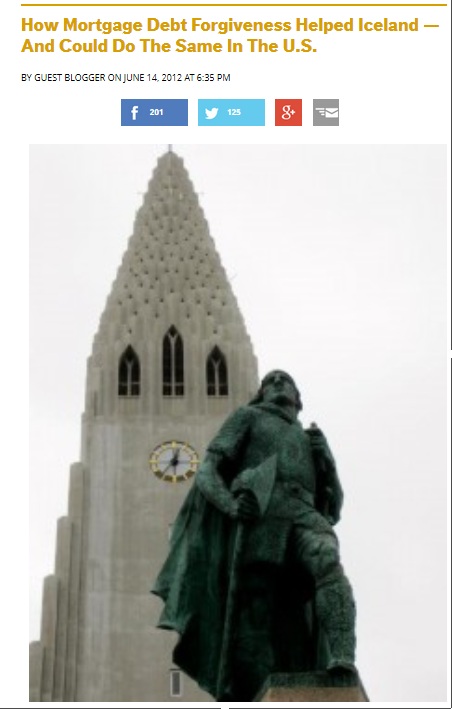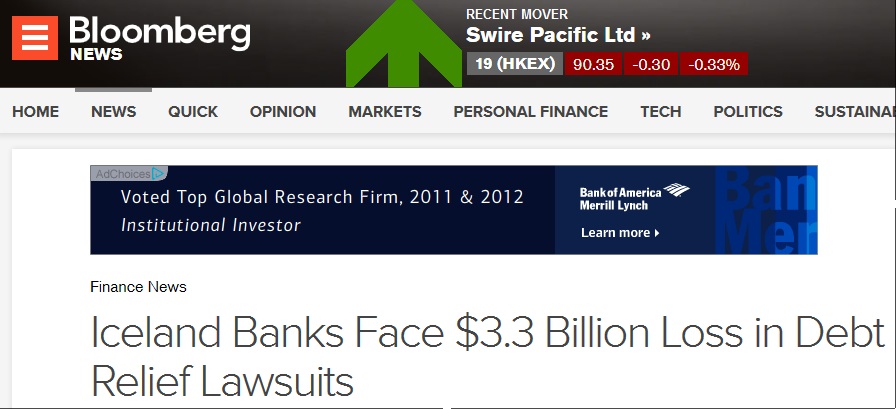CNN is not covering this. Forbes is surprised that this is happening. Bloomberg is warning the country that it isn’t good for them in the long term. Well, Iceland just drops the hammer where it needs to fall.
Iceland exemplifies, among others, a unified desire for freedom from slavery. Its elected officials are acting as they should be, true servants of the people and not of the Corporation.
We must celebrate with Iceland by replicating her methods of preserving human integrity over that of paper currency.
We must stop demanding for reforms from a government that’s been hijacked by the Corporation it needs to regulate. We must get rid of that corporate government first and eliminate all greedy corporations for good.
The Corporation and the people behind it are not responsible for the advancement of humanity as Hollywood would like to portray in the “Men Who Built America”. They are nothing more than slave-traders and exploiters, i.e. true pioneers of intellectual property infringements.
Technological advancements are brought about by Technicians, not by politicians, nor the bankers that groomed them.
We don’t need these flesh-eaters in our midst. We need to exterminate these parasites in order to remove this humongous societal cancer they have caused.
An Icelandic court has sentenced four former Kaupthing bankers to jail for market abuses related to a large stake taken in the bank by a Qatari sheikh just before it went under in late 2008.
Weeks before the country’s top three banks collapsed under huge debts as the global credit crunch struck, Kaupthing announced that Sheikh Mohammed bin Khalifa bin Hamad Al Thani had bought 5 of its shares in a confidence-boosting move.
A parliamentary commission later said the shares had been bought with a loan from Kaupthing itself.
On Thursday, a Reykjavik district court sentenced Hreidar Mar Sigurdsson, Kaupthing’s former chief executive, to five and a half years in prison while former chairman Sigurdur Einarsson received a five-year sentence.
Magnus Gudmundsson, former chief executive of Kaupthing Luxembourg, was given a three-year sentence and Olafur Olafsson – the bank’s second largest shareholder at the time – received three and a half years.
source »
Though only a tiny country of 320,000, Iceland made international headlines in 2008 when its banks defaulted on $85 billion, exemplifying the dangers of financial deregulation. But this year, Iceland’s economy will outgrow the euro area and the developed world on average.
And as difficult as it may be for conservatives here in the U.S. to stomach, at least some of the credit for Iceland’s expeditious recovery is due to its astonishing debt relief agreement.
Since the end of 2008, Iceland’s state-controlled banks have forgiven loans for more than a quarter of the population, a total equivalent to 13 percent of its annual gross domestic product. Despite shrinking 6.7 percent in 2009, Iceland’s economy is projected to expand 2.4 percent this year and next, compared with 0.2 percent in the euro area. And while Iceland’s recovery does not provide a complete parallel to U.S. economic woes, the island’s nascent success does demonstrate how loan forgiveness can help reignite a struggling economy. According to Icelandic economist Thorolfur Matthiasson:
“The lesson to be learned from Iceland’s crisis is that if other countries think it’s necessary to write down debts, they should look at how successful the [forgiveness of debt exceeding] 110 percent [of home values] agreement was here. It’s the broadest agreement that’s been undertaken.”
source »
Credit: Iceland, downtown Reykjavik, elevated view, Getty
You may have heard about Iceland’s toppling economy back in 2008. As one of the hardest-hit countries at the time, Iceland’s heavily criticized method to escape veritable economic demise actually did the trick.
Faced with the possibility of financial failure, Iceland had to think on its feet. Instead of bailing out banks USA-style, the country forgave mortgage debt for the population – and completely started over from square one.
A country with a small population of roughly 320,000 citizens, Iceland‘s entire banking structure “systemically failed” in the early days of the 2008 recession. Despite the fact that Iceland is still on the road to recovery, the country ranks high as a politically and economically stable nation. Their success over the last few years has been largely under-reported, and the story behind it is quite fascinating.
source »
–
Please support us by downloading our Second Edition of Towards Healthcare Emancipation eBook. The proceeds from this book will be used to fund our next project, Towards Energy Emancipation.
The aim is to make the subject of free energy more understandable for the layman so that anybody could replicate and install his own power plant and be completely living off-grid.
If you haven’t done so, please like our FB page to encourage others to learn more about our work.
Thank you very much for your valuable support.








